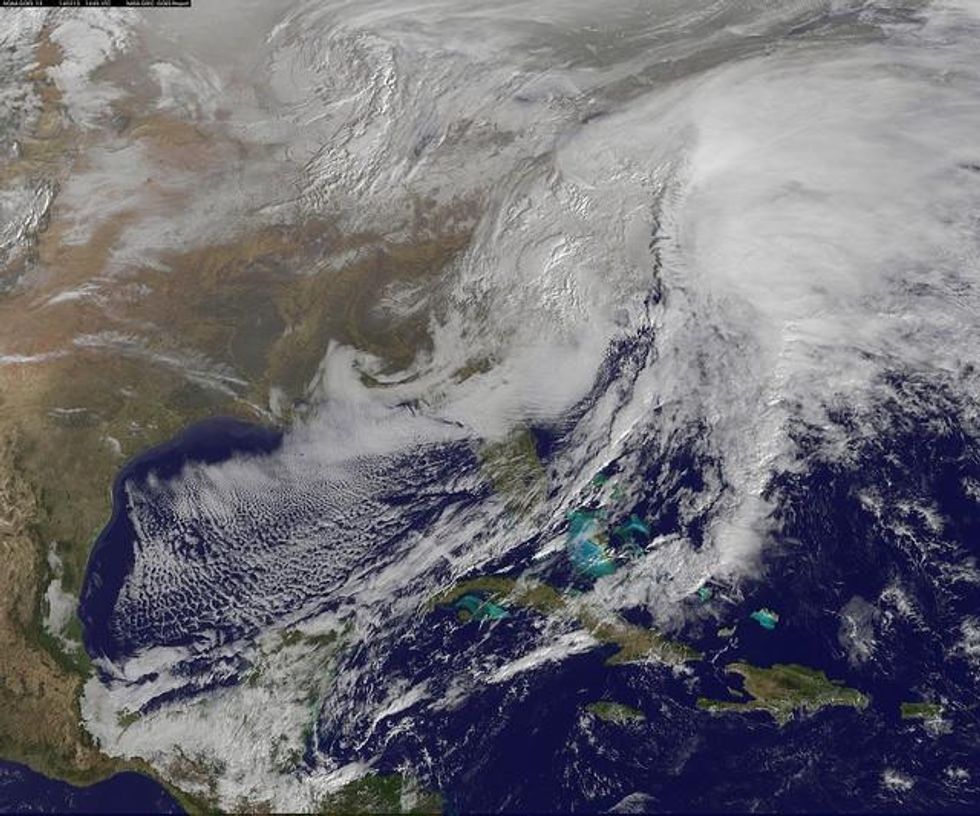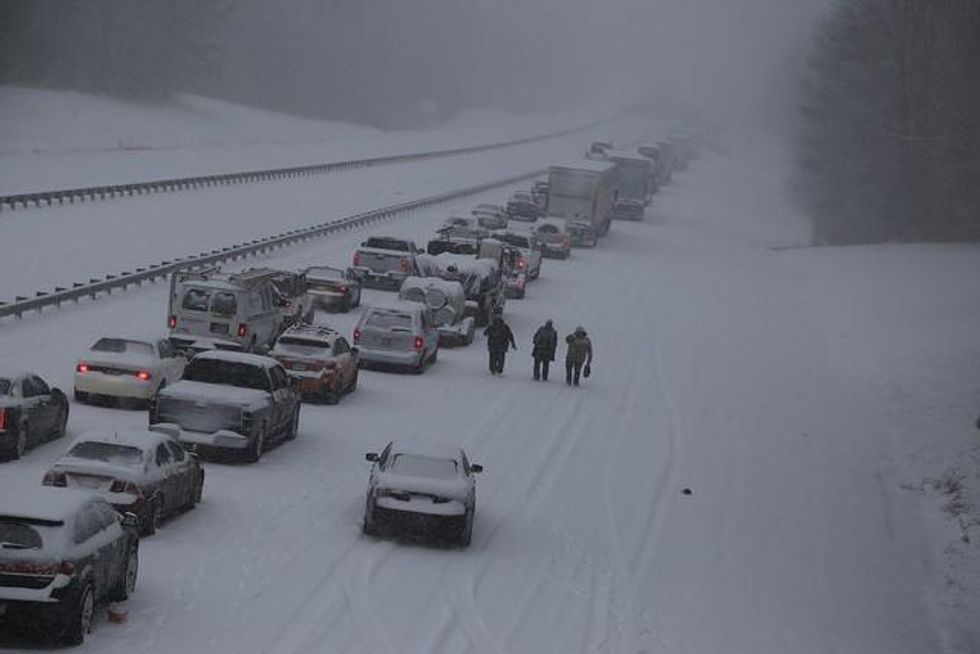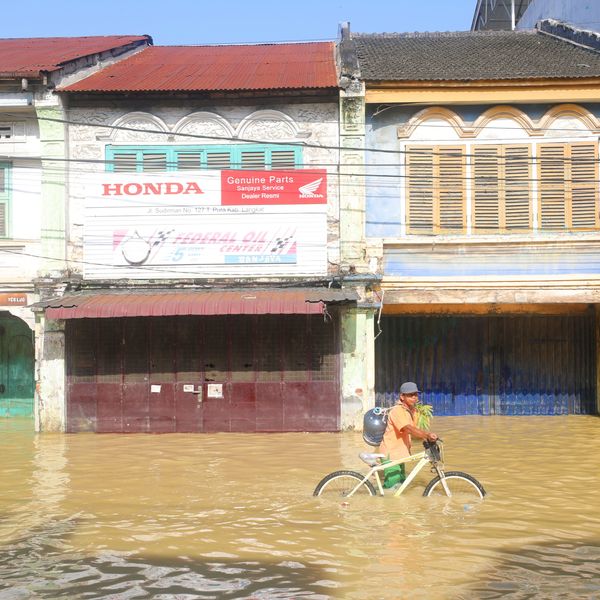Wild Winter Storm in the East, Flooding in the UK: Weather in 'Schizoid Mode'
'We have to understand that climate change is affecting all weather patterns,' says meteorologist

"The remarkable thing about this storm," meteorologist Jeff Masters told Democracy Now! Thursday morning, "is it occurs at the tail end of a very long period of intense winter that we've seen over the eastern U.S., but at the same time, the western U.S. has been struggling with record drought and all-time high temperatures in January."
"So, the weather has been in kind of this schizoid mode, where it's unusually cold over the eastern half of the U.S. and unusually warm over the western half," Masters said.
Evan Weber, co-author of the report "The Plan: How the U.S. Can Help Stabilize the Climate and Create a Clean Energy Future," points to these extremes of drought and intense winter as well, noting that they have taxed the "nation's aging infrastructure," causing both power outages and water shortages. "As climate change makes these types of extreme weather events more severe, energy security will also worsen -- unless we change course," he said.
Linking the storm hitting the eastern states now to climate change, Masters added that
we have to understand that climate change is affecting all weather patterns, regardless of the season. Yes, winter still occurs. But we do expect climate change to affect jet stream patterns in winter storms. Now, in particular, this kind of very unusual jet stream pattern that's been so persistent is something that could arise out of climate change. We don't often see the jet stream lock into place like this and not budge for a period of months. And we make that more likely--is one research avenue being explored now--if we remove a lot of sea ice in the Arctic, warming up the Arctic more than the rest of the planet.
Weber says that severe weather like this storm should be a call to action to strengthen the country's infrastructure as well as to shift to renewable energy.
"Clean renewable energy not only uses half the water as dirty 20th Century oil, gas, and coal," stated Weber, "but it also doesn't contribute to the climate change that fuels these types of debilitating weather events."
As the United States deals with both drought and snow, the UK has been hit by catastrophic flooding and winds, causing what has been called "almost unparalleled natural crisis."
While a new report from the UK's national weather service, the Met Office, said that "As yet, there is no definitive answer on the possible contribution of climate change to the recent storminess," the body's chief scientist, Julia Slingo, said, "But all the evidence suggests there is a link to climate change."

\u201cGreat flash (flood) mob in South Oxford - can we talk about climate change now? #climatesilence @ClimateOutreach\u201d— CommunityActionGroup (@CommunityActionGroup) 1392054445
__________________
An Urgent Message From Our Co-Founder
Dear Common Dreams reader, The U.S. is on a fast track to authoritarianism like nothing I've ever seen. Meanwhile, corporate news outlets are utterly capitulating to Trump, twisting their coverage to avoid drawing his ire while lining up to stuff cash in his pockets. That's why I believe that Common Dreams is doing the best and most consequential reporting that we've ever done. Our small but mighty team is a progressive reporting powerhouse, covering the news every day that the corporate media never will. Our mission has always been simple: To inform. To inspire. And to ignite change for the common good. Now here's the key piece that I want all our readers to understand: None of this would be possible without your financial support. That's not just some fundraising cliche. It's the absolute and literal truth. We don't accept corporate advertising and never will. We don't have a paywall because we don't think people should be blocked from critical news based on their ability to pay. Everything we do is funded by the donations of readers like you. Will you donate now to help power the nonprofit, independent reporting of Common Dreams? Thank you for being a vital member of our community. Together, we can keep independent journalism alive when it’s needed most. - Craig Brown, Co-founder |

"The remarkable thing about this storm," meteorologist Jeff Masters told Democracy Now! Thursday morning, "is it occurs at the tail end of a very long period of intense winter that we've seen over the eastern U.S., but at the same time, the western U.S. has been struggling with record drought and all-time high temperatures in January."
"So, the weather has been in kind of this schizoid mode, where it's unusually cold over the eastern half of the U.S. and unusually warm over the western half," Masters said.
Evan Weber, co-author of the report "The Plan: How the U.S. Can Help Stabilize the Climate and Create a Clean Energy Future," points to these extremes of drought and intense winter as well, noting that they have taxed the "nation's aging infrastructure," causing both power outages and water shortages. "As climate change makes these types of extreme weather events more severe, energy security will also worsen -- unless we change course," he said.
Linking the storm hitting the eastern states now to climate change, Masters added that
we have to understand that climate change is affecting all weather patterns, regardless of the season. Yes, winter still occurs. But we do expect climate change to affect jet stream patterns in winter storms. Now, in particular, this kind of very unusual jet stream pattern that's been so persistent is something that could arise out of climate change. We don't often see the jet stream lock into place like this and not budge for a period of months. And we make that more likely--is one research avenue being explored now--if we remove a lot of sea ice in the Arctic, warming up the Arctic more than the rest of the planet.
Weber says that severe weather like this storm should be a call to action to strengthen the country's infrastructure as well as to shift to renewable energy.
"Clean renewable energy not only uses half the water as dirty 20th Century oil, gas, and coal," stated Weber, "but it also doesn't contribute to the climate change that fuels these types of debilitating weather events."
As the United States deals with both drought and snow, the UK has been hit by catastrophic flooding and winds, causing what has been called "almost unparalleled natural crisis."
While a new report from the UK's national weather service, the Met Office, said that "As yet, there is no definitive answer on the possible contribution of climate change to the recent storminess," the body's chief scientist, Julia Slingo, said, "But all the evidence suggests there is a link to climate change."

\u201cGreat flash (flood) mob in South Oxford - can we talk about climate change now? #climatesilence @ClimateOutreach\u201d— CommunityActionGroup (@CommunityActionGroup) 1392054445
__________________

"The remarkable thing about this storm," meteorologist Jeff Masters told Democracy Now! Thursday morning, "is it occurs at the tail end of a very long period of intense winter that we've seen over the eastern U.S., but at the same time, the western U.S. has been struggling with record drought and all-time high temperatures in January."
"So, the weather has been in kind of this schizoid mode, where it's unusually cold over the eastern half of the U.S. and unusually warm over the western half," Masters said.
Evan Weber, co-author of the report "The Plan: How the U.S. Can Help Stabilize the Climate and Create a Clean Energy Future," points to these extremes of drought and intense winter as well, noting that they have taxed the "nation's aging infrastructure," causing both power outages and water shortages. "As climate change makes these types of extreme weather events more severe, energy security will also worsen -- unless we change course," he said.
Linking the storm hitting the eastern states now to climate change, Masters added that
we have to understand that climate change is affecting all weather patterns, regardless of the season. Yes, winter still occurs. But we do expect climate change to affect jet stream patterns in winter storms. Now, in particular, this kind of very unusual jet stream pattern that's been so persistent is something that could arise out of climate change. We don't often see the jet stream lock into place like this and not budge for a period of months. And we make that more likely--is one research avenue being explored now--if we remove a lot of sea ice in the Arctic, warming up the Arctic more than the rest of the planet.
Weber says that severe weather like this storm should be a call to action to strengthen the country's infrastructure as well as to shift to renewable energy.
"Clean renewable energy not only uses half the water as dirty 20th Century oil, gas, and coal," stated Weber, "but it also doesn't contribute to the climate change that fuels these types of debilitating weather events."
As the United States deals with both drought and snow, the UK has been hit by catastrophic flooding and winds, causing what has been called "almost unparalleled natural crisis."
While a new report from the UK's national weather service, the Met Office, said that "As yet, there is no definitive answer on the possible contribution of climate change to the recent storminess," the body's chief scientist, Julia Slingo, said, "But all the evidence suggests there is a link to climate change."

\u201cGreat flash (flood) mob in South Oxford - can we talk about climate change now? #climatesilence @ClimateOutreach\u201d— CommunityActionGroup (@CommunityActionGroup) 1392054445
__________________

